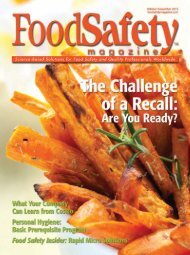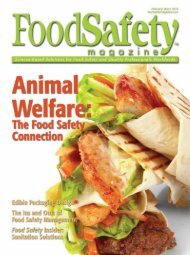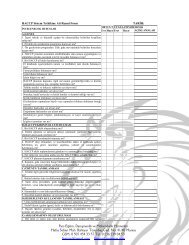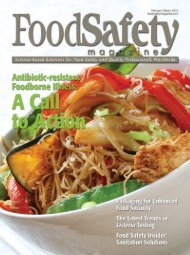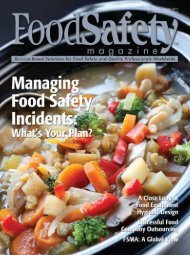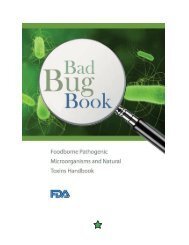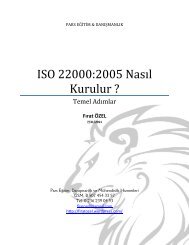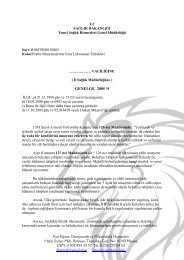Food Safety Magazine - June/July 2013
Food Safety Magazine - June/July 2013
Food Safety Magazine - June/July 2013
Create successful ePaper yourself
Turn your PDF publications into a flip-book with our unique Google optimized e-Paper software.
REGULATIONS<br />
eye toward practical recommendations for food manufacturers<br />
and growers.<br />
Growing Underlying Cost — Expanded Record Access<br />
Because the records-access provisions of FSMA became<br />
effective on passage, FDA issued an interim final rule in February<br />
2012 that expands the agency’s records access authority<br />
well beyond what was accorded the agency prior to FSMA.<br />
Previously, FDA was allowed only limited access to company<br />
including costs related to reinspection. A reinspection is one or more<br />
inspections conducted subsequent to an inspection that identified noncompliance<br />
materially related to a food safety requirement of the Act,<br />
specifically to determine whether compliance has been achieved. Reinspection-related<br />
costs means all expenses, including administrative<br />
expenses, incurred in connection with FDA’s arranging, conducting,<br />
and evaluating the results of the reinspection, and assessing and collecting<br />
the reinspection fees, 21 U.S.C. § 379j-31(a)(2)(B). For a domestic<br />
facility, FDA will assess and collect fees for reinspection-related<br />
“The passage of the <strong>Food</strong> <strong>Safety</strong> Modernization Act (FSMA) marked a<br />
historic revolution in U.S. food safety laws.”<br />
records related to specific articles of food that the agency<br />
reasonably believed to be adulterated and to present a threat<br />
of serious adverse health consequences or death to humans<br />
or animals. Now, under FSMA, FDA may demand access to<br />
company records relating to any article of food the agency<br />
believes is reasonably likely to be affected in a similar manner.<br />
FDA is using this expanded records access authority to impose<br />
ever more expansive record-keeping requirements as part of<br />
every other proposed FSMA regulation. Indeed, several new<br />
record-keeping requirements have already been unveiled in<br />
both the Produce <strong>Safety</strong> and Preventive Controls proposed<br />
rules, which are discussed more fully below.<br />
Shifting the Regulatory Cost Burden to Industry — New Reinspection<br />
and Recall Fees<br />
In August 2012, FDA announced domestic and foreign facility<br />
reinspection, as well as recall and importer reinspection<br />
fees, although FDA explicitly indicated that it would not issue<br />
invoices for reinspections or recalls until a guidance document<br />
is published, outlining a set of guidelines for small businesses.<br />
Currently, there is no fee for an initial FDA inspection; however,<br />
FSMA authorizes FDA to assess and collect fees related<br />
to certain domestic food facility, foreign food facility and importer<br />
reinspections. The fee for reinspection is to cover reinspection-related<br />
costs when an initial inspection has identified<br />
certain food safety problems. The rates for reinspection are<br />
$221 an hour per FDA field investigator if no foreign travel is<br />
required, and $289 an hour if foreign travel is required. FDA<br />
will not estimate the reinspection cost and simply states that<br />
it would be determined on a case-by-case basis. FDA also has<br />
the authority to assess and collect fees for food recall activities<br />
associated with a recall order when a domestic food facility or<br />
importer does not comply with such an order. Even though<br />
FDA has indicated that it will not issue fee invoices until the<br />
small business guidance is published, it has incorporated the<br />
following language in numerous warning letters dating back to<br />
April 2012, giving notice that it is only a matter of time before<br />
FDA begins collecting fees as authorized by FSMA.<br />
Section 743 of the Act (21 U.S.C. § 379j-31) authorizes FDA<br />
to assess and collect fees to cover FDA’s costs for certain activities,<br />
costs from the responsible party for the domestic facility. The inspection<br />
noted in this letter identified non-compliance materially related to a<br />
food safety requirement of the Act. Accordingly, FDA may assess fees<br />
to cover any costs related to reinspection. 2<br />
The Possible Hidden Costs — Facility Registration<br />
In October 2012, FDA tackled another FSMA provision,<br />
regarding registration, by issuing an updated guidance document<br />
entitled “Necessity of the Use of <strong>Food</strong> Product Categories<br />
in <strong>Food</strong> Facility Registrations and Updates to <strong>Food</strong> Product<br />
Categories.” Under this guidance, a registrant must submit<br />
a registration to FDA containing information necessary to<br />
notify the agency of the general food category of any food<br />
manufactured, processed, packed or held at such facility. FDA<br />
also now has the power to suspend a food facility registration,<br />
which it recently did to Sunland Inc., based on the company’s<br />
massive peanut butter recall. FSMA does not require registered<br />
facilities to pay a registration fee; however, in its budget<br />
request for fiscal year <strong>2013</strong>, FDA incorporated language for a<br />
<strong>Food</strong> Establishment Registration User Fee of approximately<br />
$500 per facility, which would generate approximately $220<br />
million in fees. Because FDA does not have the authority to<br />
collect this fee, Congress would need to approve the request<br />
and grant FDA authority to collect the user fees.<br />
FDA’s Interpretation of FSMA Unveiled<br />
Unlike the FSMA provisions discussed above, other provisions<br />
are being rolled out more cautiously. On January 4,<br />
<strong>2013</strong>, 2 years after FSMA was enacted, FDA proposed two<br />
comprehensive rules aimed at preventing the contamination<br />
of produce and processed foods. These proposed rules are<br />
the core of FSMA and represent a monumental change in<br />
the way FDA regulates food. Some of the significant changes<br />
outlined in these two proposed rules include requirements<br />
for companies to draft and comply with highly specific food<br />
safety plans; to adhere to much more extensive record keeping<br />
and to implement new safety measures, including, for<br />
example, requiring that farmworkers wash their hands, installing<br />
portable toilets in crop fields, as well as developing corrective<br />
action plans for handling outbreaks of foodborne illness.<br />
54 F o o d S a f e t y M a g a z i n e



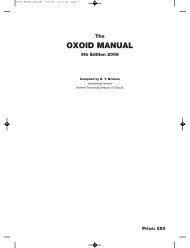
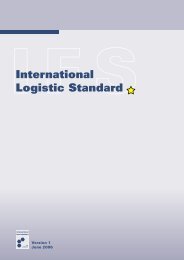
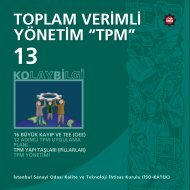
![Otomatik indirilmez ise tıklayınız [Download]](https://img.yumpu.com/44170525/1/190x190/otomatik-indirilmez-ise-taklayanaz-download.jpg?quality=85)
